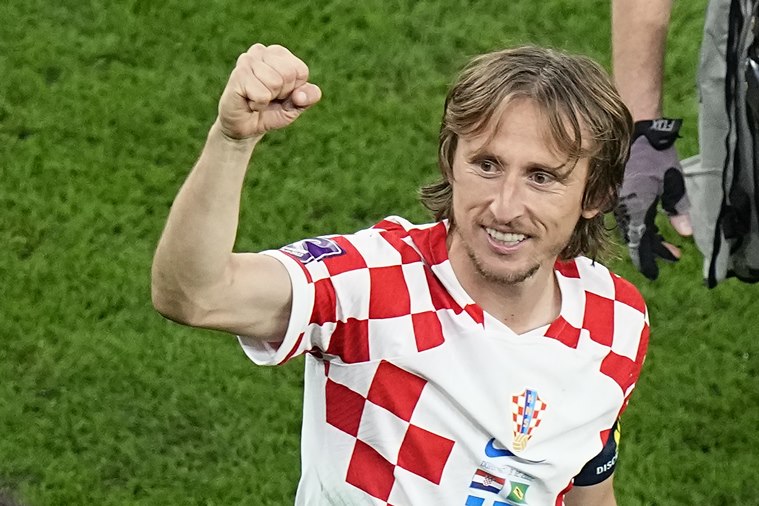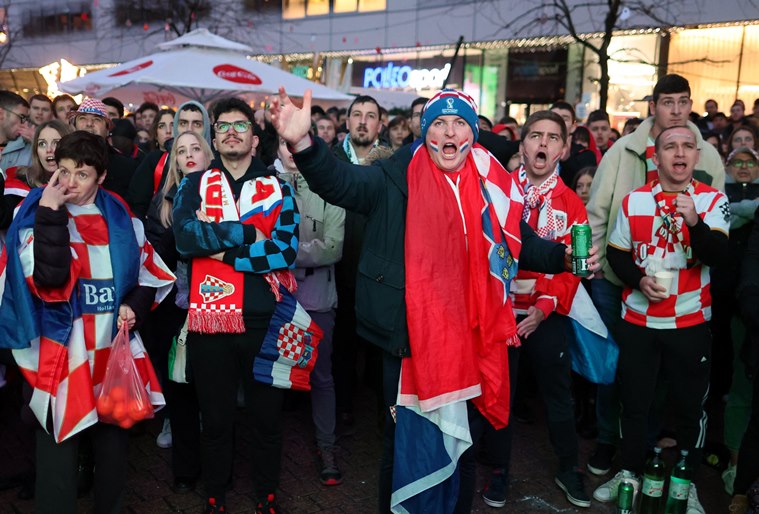
Croatian coach Zlatko Dalic did not partake in the usual histrionics that follow an underdog victory. Rather, he looked on in stunned silence as Croatian celebrations erupted around him. He had masterminded yet another World Cup victory, arguably Croatia’s biggest scalp till date.
About 10 minutes earlier, Dalic’s side looked on its way out of the World Cup on the back of a beautiful Neymar goal. Yet, in what has now become typical of his perennially underestimated team, Croatia fought back. Taking advantage of Brazil committing one too many players to attack in the dying minutes of a game — which they led (the trappings of Joga Bonito, some would say) — Croatia heroically committed men forward and restored parity. They had successfully taken the game to penalties and now the pressure of expectations was on Brazil.
As Brazil crumbled and Croatia unassumingly progressed to the semifinals, the enormity of the victory was such that even Dalic took time to register it. His stupor was followed by a proud smile, as he seemed to reflect upon his and his team’s journey over the last few years. And what a journey it has been.
For a country with a population of around 39 lakh (about the same as that of Jaipur), reaching consecutive semifinals in a World Cup is an inimitable sporting feat. In 2018, Croatia made it all the way to the finals, only losing to the greatest French team in years. In 2022, they look to repeat that feat, as they play Argentina on December 13.
As the world recovers from the World Cup’s ’s biggest upset yet, The Indian Express takes a look at Croatia’s improbable rise in the world of football and what football means to the nation.
Early success and the long wait for some more
Croatia played its first official game against Estonia in 1994. In their early years, they were a fairly decent team with talented players and passionate fans. For a newly born nation, they exceeded many expectations, making it to the quarterfinals of the Euros in 1996 and unexpectedly making it all the way to the semifinals of the 1998 World Cup, the first in the nation’s history. In players like Davor Šuker and Zvonimir Boban, they had elite footballers playing in the biggest clubs in Europe while being transcendent national icons. Croatia’s performance in the 1998 World Cup would solidify the mythology of the national team and the place it held in society.
But early success did not last long. As the first “golden generation” of Croatian players aged, the brilliance of the team withered away. Croatia would soon get caught up in a long tryst with mediocrity. While it made it to World Cups, the team failed to progress beyond the group stages. The 2008 Euros showed glimpses of a new talented generation as Croatia romped to the quarterfinals only to be brought down to Earth after three of its gen-next players — Luka Modric, Mladen Petric and Ivan Rakitic — missed penalty kicks against Turkey in the shootout.
It was not till Euro 2016 that Croatia did anything of note again, topping their group and leading to Spain’s elimination. They would lose to eventual tournament victors Portugal in the Round of 16. Their search for another deep run in a major tournament post the heroics of 1998 would continue.
Brazil’s Marquinhos is dejected after failing to score from the penalty spot as Croatia’s players celebrate winning the World Cup quarterfinal soccer match between Croatia and Brazil, at the Education City Stadium in Al Rayyan, Qatar, Friday, Dec. 9, 2022. (AP Photo/Petr David Josek)
The golden generation takes Croatia to new heights
In the aftermath of 2016, Croatia would change coaches with Zlatko Dalic coming in in 2017. Dalic had a respectable coaching career, last taking his UAE team Al Ain to the final of the 2016 AFC Champions League, the premier international club tournament in Asia. However, he was untested in top level international football, with cynics abound about his appointment. While he was talented, coaches with far greater pedigree in Europe were in the fray for the job and many fans were actually left disappointed.
But Dalic proved to be just the man Croatia needed. Croatia was entering an era where a very talented group of players was right at their peak or just beyond. Players like Luka Modric, Ivan Rakitic, Mario Mandžukic and Danijel Subašic were at the peak of their game. Slightly younger players like Marcelo Brozovic, Mateo Kovacic, and Ivan Perišic were getting there. Dalic realised that he did not need to do anything fancy to mould this generation of players into a great team.
Thus, he focused his energy into cultivating a play style that suited his players, emphasising on solid defence, game control in the midfield, and ruthless attacking when the opportunity presented. This was nothing revolutionary. Yet, coupled with Dalic’s impeccable man-management skills — he sent home forward Nikola Kalinic after a show of dissent during the group stages — Croatia rode to the finals, defeating Denmark, Russia and England in the knockouts. In this tournament, Croatia showed its class as well as its ability to persevere when it was getting outplayed. In games against Denmark and England, they looked second best for large parts of the game only to eke out wins when it really mattered.
Unfortunately, they would lose in the finals to France, bringing back painful memories of 1998. But they had well and truly achieved footballing glory for a nation that derives so much pride from its football team. This was a team that had waited patiently for years to see its talent bear fruit. As the Croatian team landed in Zagreb, they received a winner’s welcome.
At the centre of it all was midfielder Luka Modric.
 Croatia’s Luka Modric celebrates after the World Cup quarterfinal between Croatia and Brazil, at the Education City Stadium in Al Rayyan, Qatar, Friday, Dec. 9, 2022. (AP Photo/Pavel Golovkin)
Croatia’s Luka Modric celebrates after the World Cup quarterfinal between Croatia and Brazil, at the Education City Stadium in Al Rayyan, Qatar, Friday, Dec. 9, 2022. (AP Photo/Pavel Golovkin)
Luka Modric, living embodiment of Croatia
The diminutive midfield maestro’s journey to football superstardom mirrors the journey of the nation. His grandfather was killed by Serbs during the Civil War: a burnt shell of a remote cottage bears testimony to the trauma that Luka Modric lived through. From there to refugee camps in mine-infested territory, to his now mythical status, football has been the only constant in his life. Much like the rest of his compatriots, the beautiful game provided Modric both solace and salvation.
From a young age, he was better than his peers and a born leader. Toughened in the fires and explosions that he grew up around, he would go on to play for Dinamo Zagreb, Tottenham Hotspurs and Real Madrid. With Real Madrid, he has won multiple Champions League trophies, being at the heart of the midfield for Madrid’s most successful team of all time. But as he garnered international footballing plaudits, he became somewhat of a God in Croatia.
Modric is undoubtedly the greatest Croat to ever touch the ball. No other player in Croatia’s history can match his footballing sense, passing range, and uncanny ability to do exactly what his team needs to win. He won the Golden Boot (award for the best player) in the 2018 World Cup.
Qatar 2022: Croatia proves 2018 was no fluke
Unlike what many commentators felt at the time, 2018 was not a fluke. Since Dalic’s takeover, Croatia has been a consistently good team, maintaining its place in Fifa’s top 15 international teams over the period. While some of the old blood (Subašic and Mandžukic prime among them) have slowly been phased out, newer talent such as Joško Gvardiol, Nikola Vlašic and the hero of Friday’s penalty shootouts, Dominik Livakovic have infused youth and athleticism to the team. Unlike the case of 1998, the successors to this “golden generation” seem to be as talented, if not more.
Croatia might very well lose the semifinal to Messi’s Argentina. There is no shame in that. But its consistent performance, indomitable grit, and never-say-die attitude have been permanently etched in the memories of fans and neutrals alike.
 Croatia fans react as they watch the match. (Reuters Photo: Antonio Bronic)
Croatia fans react as they watch the match. (Reuters Photo: Antonio Bronic)
Born amidst the ruins of the Civil War
The Croatian football team is made up of players who have either lived through or were born in the aftermath of the brutal Croatian “Patriotic War” which pitted ethnic Croats and Serbs against each other in the crumbling ruins of the erstwhile Yugoslav state. Growing up in the town of Zadar was tough. Zadar used to see frequent violence during the War. It remains surrounded by landmines till date.
The Croatian Civil War (1991-1995), like all wars, devastated the nascent nation state and 30 years on, Croatia still lives in its shadow. It caused unfathomable economic damage, wiping out nearly a quarter of Croatia’s economy, and shaped the minds of generations of Croats through pogroms organised by ethnic Serbs during the War to the economic distress that followed.
Football as a vehicle of Croat nationalism
Football too would play a part in the War, shaping ethnic identities and fuelling nationalist fervour. Fans were at the heart of nationalist consolidation starting all the way back in the 1980s, when organised football was at its nascence in unified Yugoslavia. Football clubs in Yugoslav urban centres were built around ethnic lines and were the locations of the largest displays of ethnic identities in the Balkans. Stands would be taken over by the ultras, groups of fervent fans who would violently assert their ethnic identities, often breaking into fights with rival fans. When war broke out, these fans were often the first to organise and enlist in the armies.
Some say the War actually began when a riot broke out during a match between Dinamo Zagreb and Red Star Belgrade in 1990. The two clubs represented two of the competing ethnic nationalities in the Balkans: Dinamo was (and remains) the foremost Croat club, and Red Star was (and remains) one of Serbia’s football giants. Playing against each other, they represented competing nationalities, conflicting ethnicities, and people soon to be locked in bitter war. In the riotous melee, Dinamo’s footballer Zvonir Boban kicked a security guard, perceived to be sympathetic to the Serbs, producing an image that would go on to be symbolic of the Civil War. Till date, many call Boban’s kick, “the kick that started a war.”
The Croatian national team inherited the Croat identity. In Croatian teams, players are national heroes, symbols of ethno-national identities. Football matches are like nationalist wars, with players wearing their nation on their sleeves. Born out of the national churning of the 1980s and 1990s, players today continue to bear the indelible imprint of the War and its legacy.
If the 1998 team signified Croatia’s birth and exhibited its identity to the rest of the world, 2018 was its coming of age story with a nation finally translating its promise to achievement. 2022 is Croatia’s endgame: its quest to prove to the world that its 2018 achievement was no fluke. Thus, last night, when Croatia trounced heavyweights Brazil in a World Cup quarterfinal, the victory was a national triumph with significance stretching far beyond just the field.
This news is republished from another source. You can check the original article here


